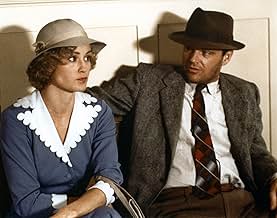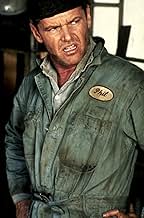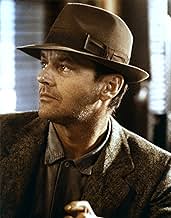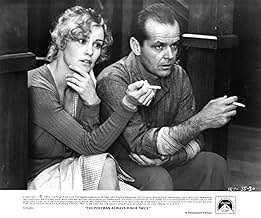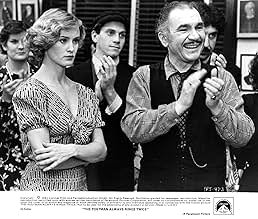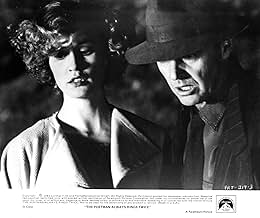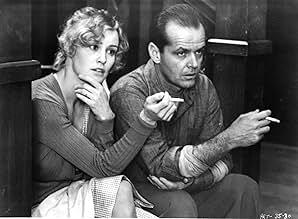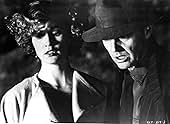IMDb रेटिंग
6.6/10
27 हज़ार
आपकी रेटिंग
एक खानसामे की कामुक पत्नी और एक जड़हीन आवारा व्यक्ति एक घनीभूत कामोत्तेजक प्रेम में पड़ जाते हैं और उसके यूनानी पति की हत्या करने की साज़िश करते हैं.एक खानसामे की कामुक पत्नी और एक जड़हीन आवारा व्यक्ति एक घनीभूत कामोत्तेजक प्रेम में पड़ जाते हैं और उसके यूनानी पति की हत्या करने की साज़िश करते हैं.एक खानसामे की कामुक पत्नी और एक जड़हीन आवारा व्यक्ति एक घनीभूत कामोत्तेजक प्रेम में पड़ जाते हैं और उसके यूनानी पति की हत्या करने की साज़िश करते हैं.
- पुरस्कार
- 1 जीत और कुल 2 नामांकन
Thomas Hill
- Barlow
- (as Tom Hill)
फ़ीचर्ड समीक्षाएं
The Postman Always Rings Twice (1981)
** (out of 4)
Considering the talent in front of and behind the camera, there's really no way to look at this adaptation of the James M. Cain novel as anything but a disappointment. In the film, Jack Nicholson plays drifter Frank Chambers who enters the lives of Cora (Jessica Lange) and her much older husband Nick (John Colicos). Soon the drifter and Cora start up a sexual relationship, which leads to them planning the murder of the husband. This here would be the fourth version of the classic story and the second one filmed in America. Unlike the previous versions, director Bob Rafelson didn't have to worry about censors but even so this version isn't nearly as hot as the earlier one with Lana Turner. Outside a rather intense sex scene towards the start of the picture, this thing really never takes off, which is too bad because they've got a terrific cast and some beautiful settings but in the end the film is just flat. I think the first forty- five minutes are the best thing in the film as we see the love triangle set up and there's no question that the director has the look of the era down perfectly. I thought the setting really added a lot of atmosphere but sadly very little else happens. Nicholson was the perfect choice to play a drifter but the screenplay really doesn't give him too much to work with. Lange is clearly the best thing in the movie as she delivers a sexual charge to the thing. Colicos is also extremely good as the husband in a strong supporting performance. What really hurts the film is the second half because the director never really makes us believe or feel anything for the two leads. Are we supposed to hate them for what they've done? Are we supposed to be rooting for them to get away with the murder and live happily ever after? The entire second half of the film features way too many dialogue scenes that lead no where and in the end the "romance" that starts to bloom towards the end just never fully works. The film isn't nearly as bad as its reputation but at the same time there's no question that it's a major disappointment and a bitter feeling takes over when you think about what could have been.
** (out of 4)
Considering the talent in front of and behind the camera, there's really no way to look at this adaptation of the James M. Cain novel as anything but a disappointment. In the film, Jack Nicholson plays drifter Frank Chambers who enters the lives of Cora (Jessica Lange) and her much older husband Nick (John Colicos). Soon the drifter and Cora start up a sexual relationship, which leads to them planning the murder of the husband. This here would be the fourth version of the classic story and the second one filmed in America. Unlike the previous versions, director Bob Rafelson didn't have to worry about censors but even so this version isn't nearly as hot as the earlier one with Lana Turner. Outside a rather intense sex scene towards the start of the picture, this thing really never takes off, which is too bad because they've got a terrific cast and some beautiful settings but in the end the film is just flat. I think the first forty- five minutes are the best thing in the film as we see the love triangle set up and there's no question that the director has the look of the era down perfectly. I thought the setting really added a lot of atmosphere but sadly very little else happens. Nicholson was the perfect choice to play a drifter but the screenplay really doesn't give him too much to work with. Lange is clearly the best thing in the movie as she delivers a sexual charge to the thing. Colicos is also extremely good as the husband in a strong supporting performance. What really hurts the film is the second half because the director never really makes us believe or feel anything for the two leads. Are we supposed to hate them for what they've done? Are we supposed to be rooting for them to get away with the murder and live happily ever after? The entire second half of the film features way too many dialogue scenes that lead no where and in the end the "romance" that starts to bloom towards the end just never fully works. The film isn't nearly as bad as its reputation but at the same time there's no question that it's a major disappointment and a bitter feeling takes over when you think about what could have been.
There are so many problems with this dull, listless filmization of the James M. Cain classic, where does one begin? Well, let's start from the beginning. It tries to compete with the great 1946 version. How do you top a film as brilliant as that? The answer is, you don't! Even if this new version does follow the original novel more closely, who cares? As the tragic, plotting lovers, Jessica Lange and Jack Nicholson have absolutely no chemistry whatsoever, so they generate very little heat in their allegedly steamy sex scenes. It's as if the filmmakers were so aware of the miscasting that they tried to disguise this by making the sex scenes between the duo more erotic, meaning more explicit. BIG MISTAKE! This just makes the lack of chemistry even more painfully obvious, and the sex scenes rather silly. Despite having virtually nothing in common, Nicholson and Lange can't keep their hands off of each other and do a lot of huffing and puffing. They go at it like two wild animals in heat, but this does little to make the film any more watchable or entertaining. Yes, Lange is even more breathtakingly beautiful than usual, and she brings more intensity and depth to the role than the script really required. But, whether she knows it or not, Nicholson is a constant thorn in her side. Sure, Jack is a great actor too, but, even though his character is a plotting murderer, there was a romantic edge to the role when John Garfield played it in 1946, and Nicholson does not have one bit of that romanticism. I still kringe when I think of him as the love interest in TERMS OF ENDEARMENT. How did he ever get to be cast in parts like that? Stay as clear from this as possible and settle only for the untoppable original.
This remake of the 1946 film which starred Lana Turner and John Garfield is significantly better than its reputation. The script, adapted from James M. Cain's first novel, is by the award-winning playwright David Mamet, while the interesting and focused cinematography is by Sven Nykvist, who did so much exquisite work for Swedish director Ingmar Bergman. An excellent cast is led by Jack Nicholson and Jessica Lange, whose cute animal magnetism is well displayed. Bob Rafelson, who has to his directorial credit the acclaimed Five Easy Pieces (1970) and The King of Marvin Gardens (1972), both also starring Jack Nicholson, captures the raw animal sex that made Cain's novel so appealing (and shocking) to a depression-era readership and brings it up to date. Hollywood movies have gotten more violent and scatological since 1981, but they haven't gotten any sexier. This phenomenon is in part due to fears occasioned by the rise of AIDS encouraged by the usual blue stocking people. Don't see this movie if sex offends you.
Lange is indeed sexy and more closely fits the part of a lower-middle class woman who married an older man, a café owner, for security than the stunning blonde bombshell Lana Turner, who was frankly a little too gorgeous for the part. John Colicos plays the café owner, Nick Papadakis, with clear fidelity to Cain's conception. In the 1946 production, the part was played by Cecil Kellaway, who was decidedly English; indeed they changed the character's name to Smith. Also changed in that production was the name of the lawyer Katz (to Keats). One wonders why. My guess is that in those days they were afraid of offending Greeks, on the one hand, and Jews on the other. Here Katz is played by Michael Lerner who really brings the character to life.
Jack Nicholson's interpretation of Cain's antihero, an ex-con who beat up on the hated railway dicks while chasing any skirt that came his way, the kind of guy who acts out his basic desires in an amoral, animalistic way, was not entirely convincing, perhaps because Nicholson seems a little too sophisticated for the part. Yet, his performance may be the sort better judged by a later generation. I have seen him in so many films that I don't feel I can trust my judgment. My sense is that he's done better work, particularly in the two films mentioned above and also in Chinatown (1974), One Flew Over the Cuckoo's Nest (1975) and such later works as The Shining (1980) and Terms of Endearment (1983).
The problem with bringing Postman successfully to the screen is two-fold. One, the underlying psychology, which so strongly appealed to Cain's depression-era readership, is not merely animalistic. More than that it reflects the economic conflict between the established haves, as represented by the greedy lawyers, the well-heeled insurance companies, the implacable court system and the simple-minded cops, and to a lesser degree by property owner Nick Papadakis himself, and the out of work victims of the depression, the have-nots, represented by Frank and Cora (who had to marry for security). Two--and this is where both cinematic productions failed--the film must be extremely fast-paced, almost exaggeratedly so, to properly capture the spirit and sense of the Cain novel. Frank and Cora are rushing headlong into tragedy and oblivion, and the pace of the film must reflect that. A true to the spirit adaptation would require a terse, stream-lined directorial style with an emphasis on blind passions unconsciously acted out, something novelist Cormac McCarthy might accomplish if he directed film. I think that Christopher Nolan, who directed the strikingly original Memento (2000) could do it.
For further background on the novel and some speculation on why it was called "The Postman Always Rings Twice" (Cain's original, apt title was "Bar-B-Que") see my review at Amazon.com.
(Note: Over 500 of my movie reviews are now available in my book "Cut to the Chaise Lounge or I Can't Believe I Swallowed the Remote!" Get it at Amazon!)
Lange is indeed sexy and more closely fits the part of a lower-middle class woman who married an older man, a café owner, for security than the stunning blonde bombshell Lana Turner, who was frankly a little too gorgeous for the part. John Colicos plays the café owner, Nick Papadakis, with clear fidelity to Cain's conception. In the 1946 production, the part was played by Cecil Kellaway, who was decidedly English; indeed they changed the character's name to Smith. Also changed in that production was the name of the lawyer Katz (to Keats). One wonders why. My guess is that in those days they were afraid of offending Greeks, on the one hand, and Jews on the other. Here Katz is played by Michael Lerner who really brings the character to life.
Jack Nicholson's interpretation of Cain's antihero, an ex-con who beat up on the hated railway dicks while chasing any skirt that came his way, the kind of guy who acts out his basic desires in an amoral, animalistic way, was not entirely convincing, perhaps because Nicholson seems a little too sophisticated for the part. Yet, his performance may be the sort better judged by a later generation. I have seen him in so many films that I don't feel I can trust my judgment. My sense is that he's done better work, particularly in the two films mentioned above and also in Chinatown (1974), One Flew Over the Cuckoo's Nest (1975) and such later works as The Shining (1980) and Terms of Endearment (1983).
The problem with bringing Postman successfully to the screen is two-fold. One, the underlying psychology, which so strongly appealed to Cain's depression-era readership, is not merely animalistic. More than that it reflects the economic conflict between the established haves, as represented by the greedy lawyers, the well-heeled insurance companies, the implacable court system and the simple-minded cops, and to a lesser degree by property owner Nick Papadakis himself, and the out of work victims of the depression, the have-nots, represented by Frank and Cora (who had to marry for security). Two--and this is where both cinematic productions failed--the film must be extremely fast-paced, almost exaggeratedly so, to properly capture the spirit and sense of the Cain novel. Frank and Cora are rushing headlong into tragedy and oblivion, and the pace of the film must reflect that. A true to the spirit adaptation would require a terse, stream-lined directorial style with an emphasis on blind passions unconsciously acted out, something novelist Cormac McCarthy might accomplish if he directed film. I think that Christopher Nolan, who directed the strikingly original Memento (2000) could do it.
For further background on the novel and some speculation on why it was called "The Postman Always Rings Twice" (Cain's original, apt title was "Bar-B-Que") see my review at Amazon.com.
(Note: Over 500 of my movie reviews are now available in my book "Cut to the Chaise Lounge or I Can't Believe I Swallowed the Remote!" Get it at Amazon!)
A remake of the 1946 film, this version features Jack Nicholson and Jessica Lange, with a momentous white hot chemistry that can't possibly sustain itself but affords a memorable scene in the restaurant kitchen about ten minutes into the film which leads to the eventual plot to do in her older Greek husband. A story wherein neither would have the nerve to do such a thing alone, but together they make a job of it on one of the darkest nights and darkest rural roads ever. The trial for the murder features another couple of great performances by Michael Lerner as the resourceful to a fault defense attorney (if you were on trial for your life, you'd want this guy for a lawyer), and his investigator who becomes a menacing presence later in the film, played by John P Ryan. Very nicely photographed in color, it's set in the coastal hills and valleys north of LA, dotted with live oaks and capturing the rich earthy tones of the late afternoon golden hued hillsides that nicely contrast with the desperate story of the two lovers.
Immensely watchable, this remake of the 1940s classic is sexed up by writer David Mamet and director Bob Rafelson. Jack Nicholson is a drifter who ingratiates himself into the lives of roadside diner/gas station owner John Colicos and his impossibly sexy wife Jessica Lange. Soon Lange and Nicholson are having sex EVERYWHERE...and plotting to bump off Colicos. Aided by great cinematography by Sven Nykvist and very evocative production design by George Jenkins, Rafelson manages to capture James M. Cain's ironic novel and all it's sordidness. Nicholson is terrific but Lange gives a career making performance...this is the movie that put her on the map after the KING KONG debacle. There are times when she acts Nicholson off the screen. Colicos is fine, if a bit old for his role and Michael Lerner is in it too. Anjelica Huston has a really odd cameo as a lion tamer!
क्या आपको पता है
- ट्रिवियाDavid Mamet's first screenplay.
- गूफ़Modern-day paper currency is used in craps game set during Great Depression, instead of silver certificate dollar bills then in use.
- भाव
Cora: I gotta have you, Frank. If it was just us. If it was just you and me.
Frank Chambers: What are you talking about?
Cora: I'm getting tired of what's right and wrong.
Frank Chambers: They hang people for that, Cora.
- इसके अलावा अन्य वर्जनCBS edited 30 minutes from this film for its 1986 network television premiere.
- कनेक्शनEdited into American Cinema: Film Noir (1995)
टॉप पसंद
रेटिंग देने के लिए साइन-इन करें और वैयक्तिकृत सुझावों के लिए वॉचलिस्ट करें
- How long is The Postman Always Rings Twice?Alexa द्वारा संचालित
विवरण
- रिलीज़ की तारीख़
- कंट्री ऑफ़ ओरिजिन
- भाषाएं
- इस रूप में भी जाना जाता है
- El cartero siempre llama dos veces
- फ़िल्माने की जगहें
- Barnsdall Rio Grande Service Station, Goleta, कैलिफोर्निया, संयुक्त राज्य अमेरिका(Cora and a Drunk Nick and Frank get Fuel)
- उत्पादन कंपनियां
- IMDbPro पर और कंपनी क्रेडिट देखें
बॉक्स ऑफ़िस
- बजट
- $1,20,00,000(अनुमानित)
- US और कनाडा में सकल
- $1,23,76,625
- दुनिया भर में सकल
- $1,23,83,416
इस पेज में योगदान दें
किसी बदलाव का सुझाव दें या अनुपलब्ध कॉन्टेंट जोड़ें

टॉप गैप
What was the official certification given to The Postman Always Rings Twice (1981) in Japan?
जवाब

